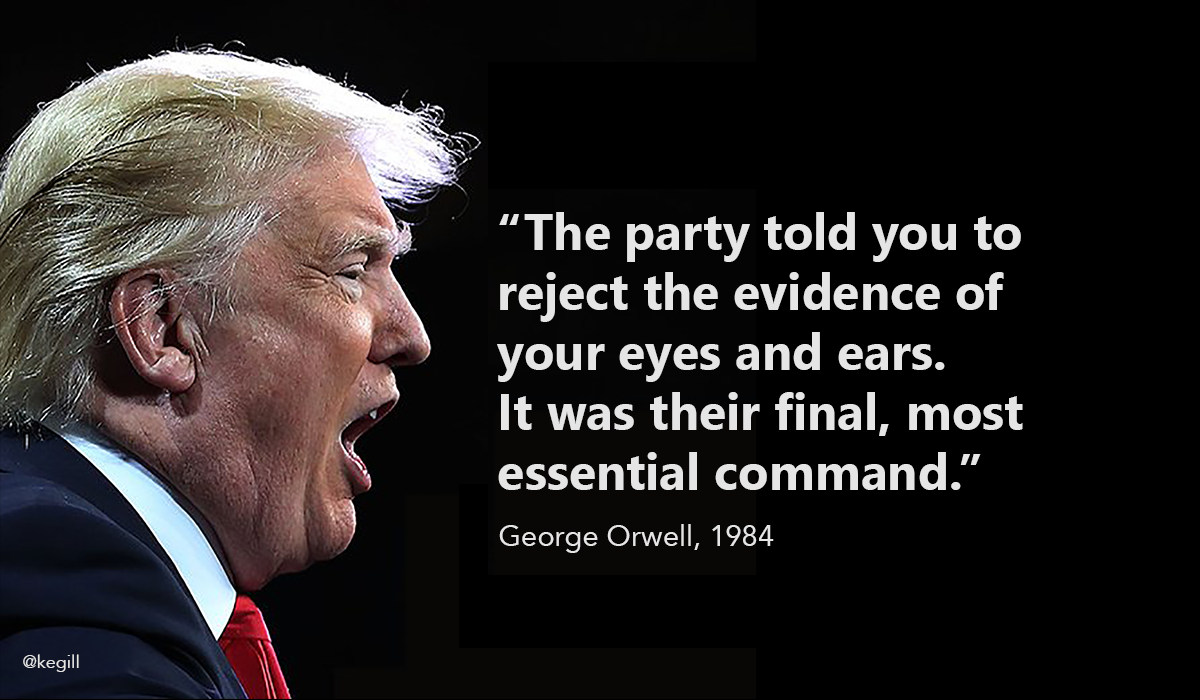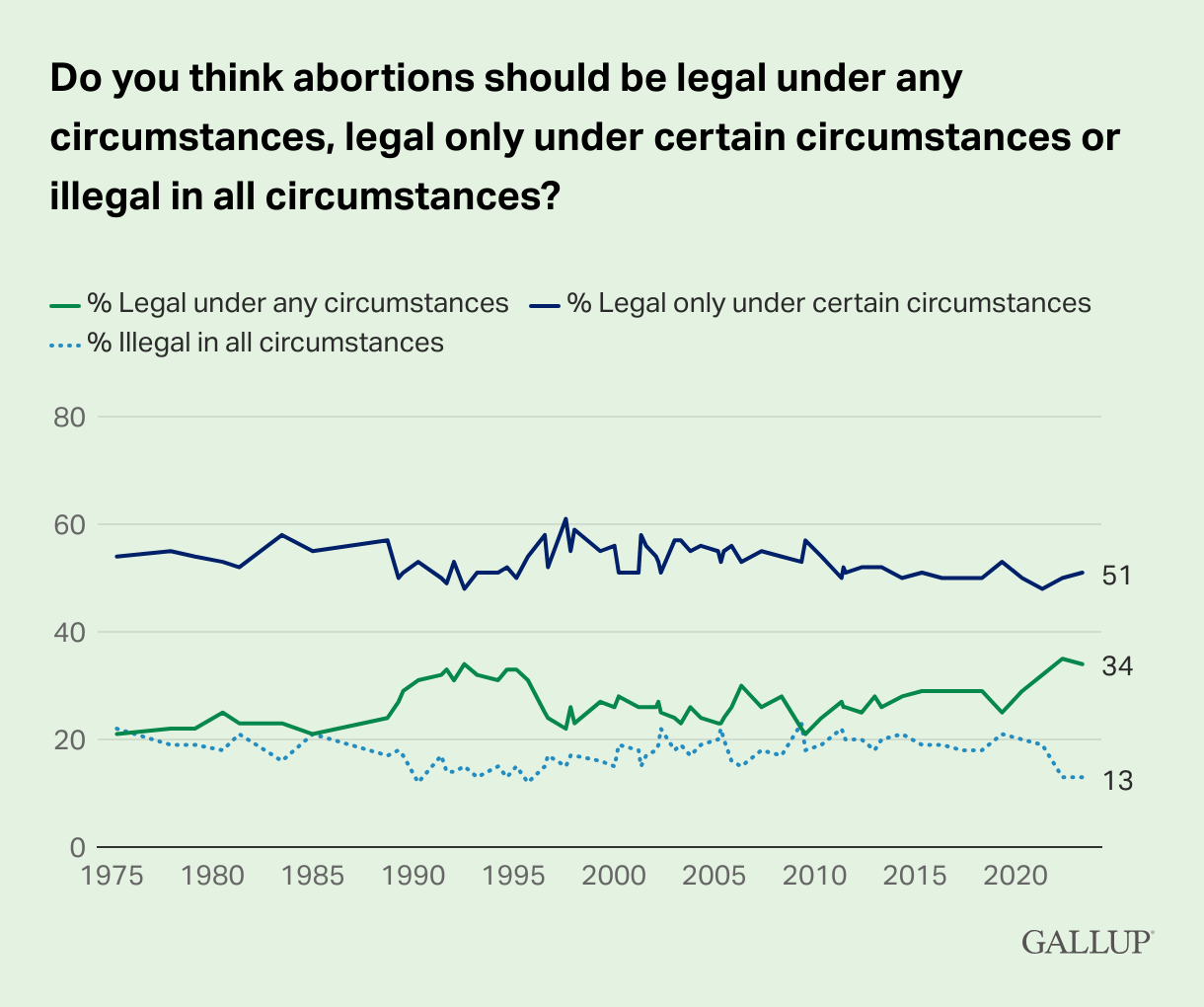Plus a lie about support for restricting abortion access

The Arizona Supreme Court has, at least temporarily, ruled that a Civil War era law banning abortion is legal, as we reported previously (here and here).
On Wednesday, reporters asked presidential candidate Donald Trump “Did Arizona go too far?” while standing outside the airport terminal in Atlanta.
Trump replied (emphasis added):
Yeah, they did [go to far]. And that will be straightened out. Everything is, as you know, it’s about state’s rights. It’ll be straightened out. And I’m sure that the governor and everybody else are going to bring it back into reason and that will be taken care of I think very quickly… See, it’s all of what the the will of the people. This is what I’ve been. Saying it’s a perfect system. So for 52 years, people have wanted to end Roe v Wade to get it back to the states. We did that. It was an incredible thing, an incredible achievement. We did that. And now the states have it and the states are putting out what they wanted. The will of the people. So Florida’s probably going to change. Arizona is going to definitely change. Everybody wants that to happen and you’re getting the will of the people. It’s been pretty amazing when you think.
Trump delivered a classic “no sides” non-answer, complete with a lie.
- It “will be straightened out” is intended to signal “this is a bad piece of legislation.”
- “It’s all about state’s rights” is a classic dog whistle to White supremacists.
- Again, with “bring it [abortion rights] back into reason,” Trump suggests that the 1864 law went too far.
- “This is a perfect system” once again salutes “state’s rights.”
- And the lie? That “everybody” wants restrictive abortion law at the state level.
“Everybody” does not want abortion to be banned.
In its most recent data, “A record-high 69%” told Gallup that they thought “abortion should generally be legal in the first three months of pregnancy.”
Only 13% of Americans (+/-3%, probably) want to ban abortion.
Moreover, abortion limited to the first “six weeks” is effectively a total ban as it is two weeks after a woman’s first missed period if she has a “normal” cycle. Many (most?) do not.
Trump takes credit for Dobbs
The partnership of Trump and then-Senate Majority Leader Mitch McConnell led to a Supreme Court packed with justices who lied under oath about their endorsement of legal precedent during their confirmation hearings. They voted to overturn Roe v Wade on June 24, 2022.
- January 31, 2017: Trump nominated Neil Gorsuch, almost immediately after being sworn in. The Senate confirmed (55-45) on April 7, 2017. Gorsuch replaced Justice Antonin Scalia, who had died in February 2016. McConnell immediately stated he would not move a nomineed forward. He blocked President Barack Obama’s nomination of Merrick Garland.
Gorsuch on Roe:
“Roe v. Wade, decided in 1973, is a precedent of the U.S. Supreme Court. It has been reaffirmed. The reliance interest considerations are important there, and all of the other factors that go into analyzing precedent have to be considered. It is a precedent of the U.S. Supreme Court. It was reaffirmed in Casey in 1992 and in several other cases. So a good judge will consider it as precedent of the U.S. Supreme Court worthy as treatment of precedent like any other.” - July 9, 2018: Trump nominated Brett Kavanaugh to replace Justice Anthony Kennedy. On October 6, 2018, the Senate confirmed (50-48).
Kavanaugh on Roe:
“[Roe v Wade] is settled as a precedent of the Supreme Court, entitled the respect under principles of stare decisis. And one of the important things to keep in mind about Roe v. Wade is that it has been reaffirmed many times over the past 45 years, as you know, and most prominently, most importantly, reaffirmed in Planned Parenthood v. Casey in 1992… I understand the importance of the precedent set forth in Roe v. Wade… Roe v. Wade is an important precedent of the Supreme Court. It has been reaffirmed many times. It was reaffirmed in Planned Parenthood v. Casey in 1992 …That makes Casey precedent on precedent.” - September 26, 2020: Trump nominated Amy Coney Barrett to replace Ruth Bader Ginsburg. Although he insisted that Obama did not have the right to nominate a justice almost a year before his term ended, McConnell pushed through Barrett’s nomination one month later, less than two weeks before the November election. The Senate confirmed (51-48) on October 26, 2020.
Barrett on Roe:
“I have no agenda to try to overrule Casey. I have an agenda to stick to the rule of law and decide cases as they come.”
Trump and McConnell packed the court for decades to come. Given the Democratic Party’s control over the Senate and White House, Democrats should consider the potential for the court to become even more radically right and act accordingly. Associate Justice Sonia Sotomayor is 70 this year; Associate Justice Elena Kagan is 64 this year; and Associate Justice Ketanji Brown Jackson, 54.
In May 2023, Trump bragged that he had killed Roe v Wade, thus unleashing the chaos that this latest decision in Arizona represents.
The 2016 campaign
Trummp’s bragging about killing Roe v Wade is telling in the context of a March 30, 2016 town hall in Green Bay, Wisconsin.
In that town hall with MSNBC journalist Chris Matthews serving as moderator, Trump insisted that women who obtained an abortion should be punished.
After an audience member asked Trump’s stance on reproductive freedom,
Matthews asked Trump: “What should the law be on abortion?“
From the (cobbled from multiple sources) transcript (emphasis added):
TRUMP: Well, you know, they’ve set the law and frankly the judges — I mean, you’re going to have a very big election coming up for that reason, because you have judges where it’s a real tipping point.
MATTHEWS: I know.
TRUMP: And with the loss of (Supreme Court Justice Antonin) Scalia, who was a very strong conservative…
MATTHEWS: I understand.
TRUMP: … this presidential election is going to be very important, because when you say, “what’s the law, nobody knows what the law’s going to be. It depends on who gets elected, because somebody is going to appoint conservative judges and somebody is going to appoint liberal judges, depending on who wins.
MATTHEWS: I know. I never understood the pro-life position.
TRUMP: Well, a lot of people do understand.
MATTHEWS: I never understood it. Because I understand the principle, it’s human life as people see it.
TRUMP: Which it is.
MATTHEWS: But what crime is it?
TRUMP: Well, it’s human life.
MATTHEWS: No, should the woman be punished for having an abortion?
TRUMP: Look…
MATTHEWS: This is not something you can dodge.
TRUMP: It’s a — no, no…
MATTHEWS: If you say abortion is a crime or abortion is murder, you have to deal with it under law. Should abortion be punished?
TRUMP: Well, people in certain parts of the Republican Party and conservative Republicans would say, “yes, they should be punished.”
MATTHEWS: How about you?
TRUMP: I would say that it’s a very serious problem. And it’s a problem that we have to decide on. It’s very hard.
MATTHEWS: But you’re for banning it?
TRUMP: I’m going to say — well, wait. Are you going to say, put them in jail? Are you — is that the (inaudible) you’re talking about?
MATTHEWS: Well, no, I’m asking you because you say you want to ban it. What’s that mean?
TRUMP: Well, you know, you go back to a position like they had where people will perhaps go to illegal places —
MATTHEWS: Yeah.
TRUMP: But you have to ban it.
MATTHEWS: You banning, they go to somebody who flunked out of medical school.
TRUMP: Are you Catholic?
MATTHEWS: Yes, I think …
TRUMP: And how do you feel about the Catholic Church’s position?
MATTHEWS: Well, I accept the teaching authority of my church on moral issues.
TRUMP: I know, but do you know their position on abortion?
MATTHEWS: Yes, I do.
TRUMP: And do you concur with the position?
MATTHEWS: I concur with their moral position but legally, I get to the question — here’s my problem with it …
(LAUGHTER)
TRUMP: No, no, but let me ask you: But what do you say about your church?
MATTHEWS: It’s not funny.
TRUMP: Yes, it’s really not funny. What do you say about your church? They’re very, very strong.
MATTHEWS: They’re allowed to — but the churches make their moral judgments, but you running for president of the United States will be chief executive of the United States. Do you believe …
TRUMP: No, but …
MATTHEWS: Do you believe in punishment for abortion, yes or no, as a principle?
TRUMP: The answer is that there has to be some form of punishment.
MATTHEWS: For the woman?
TRUMP: Yes, there has to be some form.
MATTHEWS: Ten cents? Ten years? What?
TRUMP: Let me just tell you — I don’t know. That I don’t know. That I don’t know.
MATTHEWS: Why not?
TRUMP: I don’t know.
MATTHEWS: You take positions on everything else.
TRUMP: Because I don’t want to — I frankly, I do take positions on everything else. It’s a very complicated position.
Of course, Trump responded to the outcry by saying he was misunderstood.
“Not the odds, but the stakes.” That’s how Jay Rosen, NYU journalism professor and media critic, thinks news organizations should be covering the 2024 presidential election.
“The stakes, of course, mean the stakes for American democracy,” Rosen told Oliver Darcy, CNN, last year. “The stakes are what might happen as a result of the election.” Rosen continued: “The horse race [odds] should not be the model… It should not be the organizing principle of your campaign coverage.”
In that spirit, I am writing periodic reports focused on the stakes facing voters in this presidential election.

Talk to me: BlueSky | Facebook | Mastodon | Twitter
Known for gnawing at complex questions like a terrier with a bone. Digital evangelist, writer, teacher. Transplanted Southerner; teach newbies to ride motorcycles. @kegill (Twitter and Mastodon.social); wiredpen.com

















